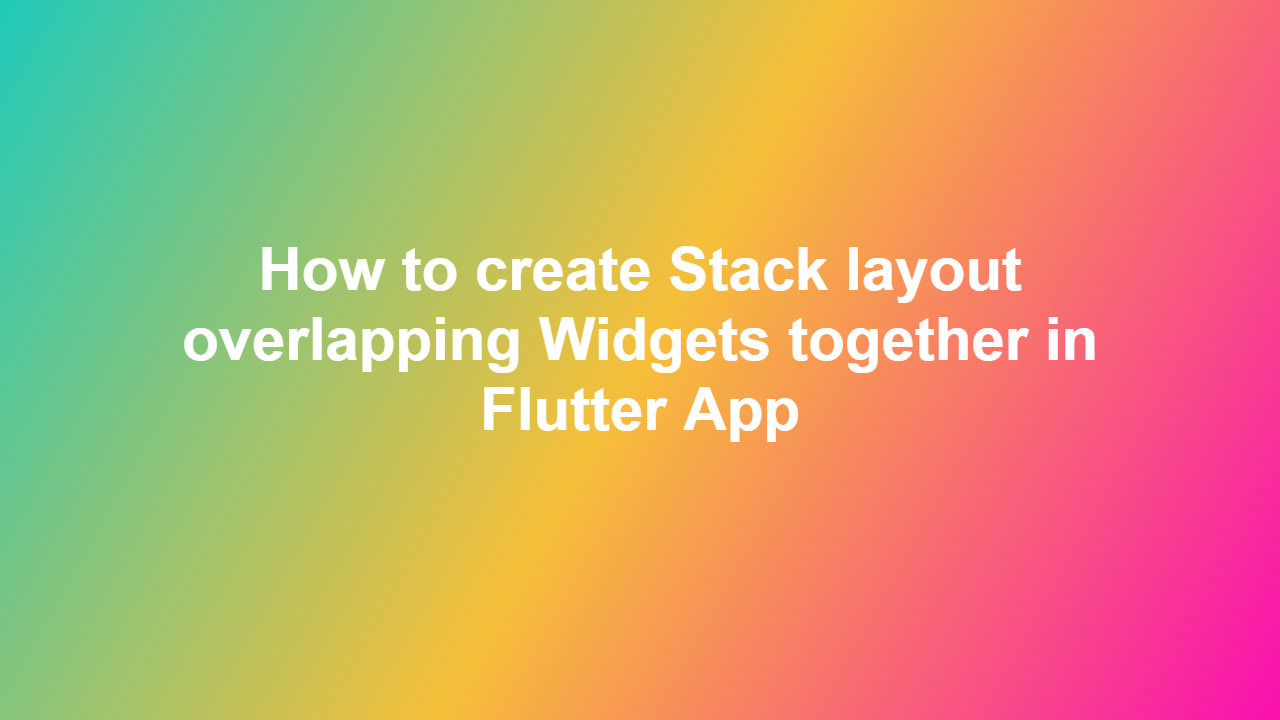How to create Stack layout overlapping Widgets together in Flutter App
Introduction
Flutter is a popular framework for building natively compiled mobile, web, and desktop applications from a single codebase. One of the key features of Flutter is its ability to create custom and complex layouts using its built-in widgets. In this article, we will discuss how to create a stack layout overlapping widgets together in a Flutter app.
Understanding Stack Layout
The Stack layout in Flutter is a widget that allows its children to overlap each other. It is a fundamental layout widget that can be used to create complex and custom designs. The Stack layout takes a list of children and stacks them on top of each other, with the first child at the bottom and the last child at the top.
Creating a Stack Layout
To create a stack layout in Flutter, you can use the `Stack` widget. The `Stack` widget takes a list of children and stacks them on top of each other. Here is an example of how to create a simple stack layout:
“`dart
Stack(
children: [
Container(
width: 200,
height: 200,
color: Colors.red,
),
Container(
width: 150,
height: 150,
color: Colors.blue,
margin: EdgeInsets.only(top: 25, left: 25),
),
Container(
width: 100,
height: 100,
color: Colors.green,
margin: EdgeInsets.only(top: 50, left: 50),
),
],
)
“`
In this example, we have three `Container` widgets that are stacked on top of each other. The first `Container` is at the bottom, and the last `Container` is at the top.
Customizing the Stack Layout
You can customize the stack layout by using the `alignment` and `textDirection` properties. The `alignment` property allows you to specify the alignment of the children, while the `textDirection` property allows you to specify the direction of the text.
“`dart
Stack(
alignment: Alignment.center,
textDirection: TextDirection.ltr,
children: [
Container(
width: 200,
height: 200,
color: Colors.red,
),
Container(
width: 150,
height: 150,
color: Colors.blue,
margin: EdgeInsets.only(top: 25, left: 25),
),
Container(
width: 100,
height: 100,
color: Colors.green,
margin: EdgeInsets.only(top: 50, left: 50),
),
],
)
“`
In this example, we have set the `alignment` property to `Alignment.center` and the `textDirection` property to `TextDirection.ltr`.
Overlapping Widgets
To overlap widgets in a stack layout, you can use the `Positioned` widget. The `Positioned` widget allows you to specify the position of a child within the stack.
“`dart
Stack(
children: [
Container(
width: 200,
height: 200,
color: Colors.red,
),
Positioned(
top: 50,
left: 50,
child: Container(
width: 150,
height: 150,
color: Colors.blue,
),
),
Positioned(
top: 100,
left: 100,
child: Container(
width: 100,
height: 100,
color: Colors.green,
),
),
],
)
“`
In this example, we have used the `Positioned` widget to overlap the blue and green containers on top of the red container.
Conclusion
In conclusion, creating a stack layout overlapping widgets together in a Flutter app is a straightforward process. By using the `Stack` widget and customizing its properties, you can create complex and custom designs. You can also use the `Positioned` widget to overlap widgets and create a layered effect.
FAQ
1. What is the purpose of the `Stack` widget in Flutter?
The `Stack` widget is used to create a layout where its children can overlap each other.
2. How do I customize the alignment of the children in a `Stack` widget?
You can customize the alignment of the children by using the `alignment` property.
3. Can I use the `Positioned` widget to overlap widgets in a `Stack` widget?
Yes, you can use the `Positioned` widget to overlap widgets in a `Stack` widget.
4. How do I specify the direction of the text in a `Stack` widget?
You can specify the direction of the text by using the `textDirection` property.
5. Can I use the `Stack` widget to create a complex layout with multiple overlapping widgets?
Yes, you can use the `Stack` widget to create a complex layout with multiple overlapping widgets.
